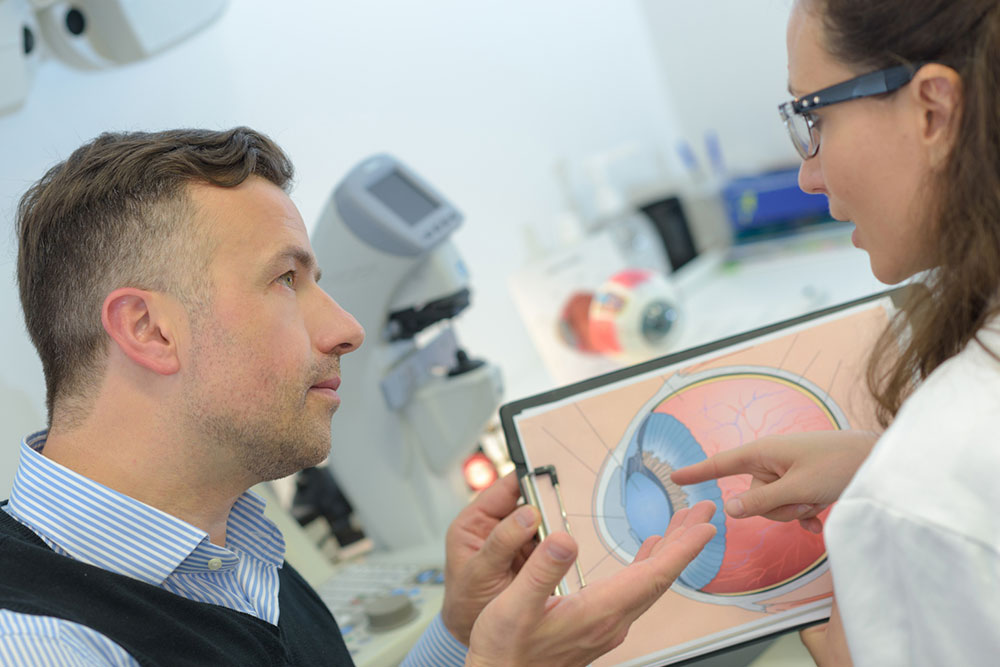
Macular degeneration – Types, causes, signs, and management
Macular degeneration is a condition that affects countless people worldwide. It is a dominant cause of vision loss, particularly in older adults. There are different types of macular degeneration, each with its own set of symptoms and causes. This article will provide an overview of the different types of macular degeneration, the symptoms to watch out for, the possible causes, and some remedies and treatments that can help manage the condition.
Understanding macular degeneration
Macular degeneration is a complex eye condition that affects the macula. It is the central part of the retina responsible for sharp and clear vision. It is important to have a brief understanding of this condition to better comprehend its impact and the available treatments.
Types
Macular degeneration can be classified into two main types: Wet and dry.
Dry macular degeneration – It is a form accounting for around 90% of cases. Under the macula, yellow deposits called drusen accumulate, gradually deteriorating vision.
Wet macular degeneration – This type is slightly less common in people, but it can cause severe consequences. The development of abnormal blood vessels under the macula leads to this condition. This results in a leak of fluid or blood, causing rapid vision loss.
Causes
Macular degeneration is a complex eye condition, and understanding its causes can help individuals make informed decisions about their eye health. Several factors contribute to the development of macular degeneration, including:
-
- Age
Age is the most significant risk factor for macular degeneration. The condition is more common in individuals over 60 years of age, and the risk increases with each passing decade.
- Age
-
- Head injuries
Severe head injuries can increase the risk of macular degeneration. The trauma to the head can damage the delicate structures of the eye, including the macula.
- Head injuries
- Food regimen
A food regimen high in saturated fat, cholesterol, and processed foods can increase the risk of macular degeneration. In contrast, a meal plan abundant in vegetables, fruits, and omega-3-rich foods may help safeguard against the ailment.
Signs and symptoms
Macular degeneration symptoms can vary depending on the type and severity of the condition. Here are some common symptoms to be aware of when it comes to macular degeneration:
-
- Blurred or distorted vision
One of the most noticeable symptoms of macular degeneration is a loss of clear vision. This can manifest as blurred vision or difficulty focusing on objects.
- Blurred or distorted vision
-
- Difficulty with reading or recognizing faces
Macular degeneration can lead to loss of central vision, which is important for reading small print or recognizing familiar faces. This can make reading a book or recognizing loved ones more difficult.
- Difficulty with reading or recognizing faces
-
- Dark or empty spot in the central vision
Another common symptom of macular degeneration is a dark or empty spot in the midst of one’s vision. This can create a blind spot that affects one’s potential to see clearly.
- Dark or empty spot in the central vision
-
- Reduced color perception
Macular degeneration can also affect one’s ability to perceive colors accurately. Colors may seem less dynamic or washed out, making it harder to distinguish between different shades.
- Reduced color perception
- Conflict in low light or night vision
Some individuals with macular degeneration may find it more strenuous to see in low light or at night. This can make navigating dimly lit spaces or driving safely after dark challenging.
Treatment
When it comes to treating macular degeneration, there are several options available that can help manage the condition and preserve vision. Here are some of the common treatments used:
-
- Laser therapy
In some cases, laser therapy is used to foil leaking blood vessels or destroy abnormal blood vessels in the eye.
- Laser therapy
-
- Photodynamic therapy
During this treatment, a laser can be used to target abnormal blood vessels by administering a light-sensitive supplement into the bloodstream.
- Photodynamic therapy
- Low vision aids
For individuals with advanced macular degeneration, low vision aids like magnifiers, telescopes, and specialized glasses can improve their remaining vision.
Natural remedies
Natural approaches may help slow down its progression and improve overall eye health. Here are a few potential natural remedies to consider:
- Eating antioxidant-rich foods
Antioxidant-rich foods can protect the eyes from oxidative damage that contributes to macular degeneration. One should include fruits and vegetables like oranges, peppers, berries, and leafy greens in their daily meals. These provide antioxidants like vitamin C, beta-carotene, and lutein.
One can also enjoy nuts, seeds, legumes, and whole grains. Their fiber keeps the digestive system healthy to absorb nutrients. It is important to stay hydrated with water, herbal teas, and coconut water. Proper hydration is key for eye health.
-
- Exercise
Regular exercise can help manage macular degeneration by lowering inflammation and blood pressure.
- Exercise
- Eye protection
Shielding the eyes from excessive sunlight can prevent further damage. When outside for long periods, wear sunglasses and a hat. Also, take breaks when using screens for extended periods.




